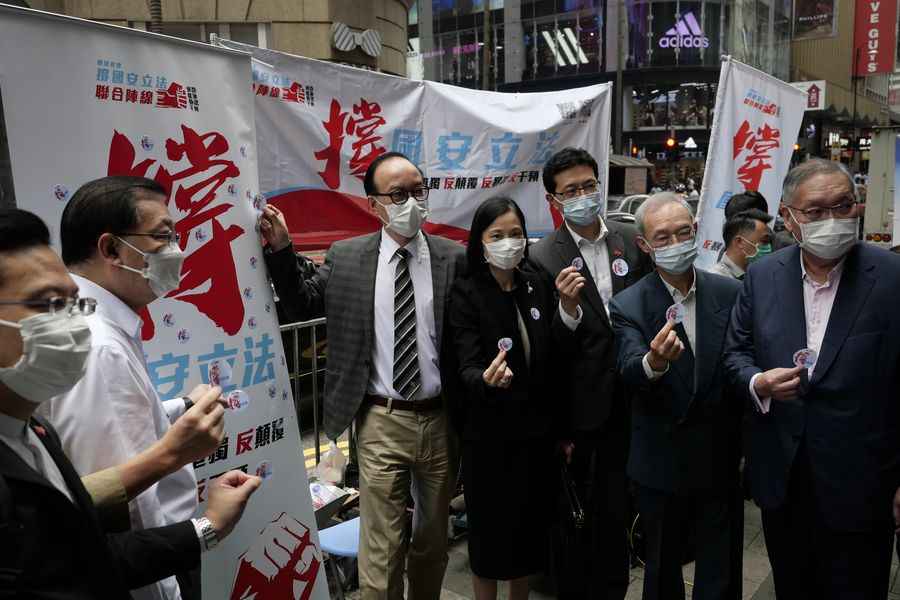HKSAR gov't voices deep regret over U.S. smearing China's legitimate rights to protect national security

HONG KONG, May 30 (Xinhua) -- China's Hong Kong Special Administrative Region (HKSAR) government on Saturday voiced deep regret that the U.S. government continued to smear and demonize the legitimate rights and duty of China to safeguard national security in the HKSAR which is aimed at restoring stability to Hong Kong society.
A spokesperson of the HKSAR government made the remarks in response to the statement by U.S. President Donald Trump and comments by the U.S. State Department over the past two days.
Hong Kong is an inalienable part of China and any suggestion that China does not have the right to protect its own territory from separatists, terror and anarchy does not stand up to scrutiny and smacks of hypocrisy and double standards, the spokesman said.
To allege that the improved legal system and enforcement mechanisms targeting an extremely small minority of criminals to be introduced by the national security law is undermining Hong Kong people's freedoms is simply fallacious, the spokesman said.
The spokesman said every country has legislation in place to safeguard national security, including the United States.
The existence of those laws to safeguard a country's national security and sovereignty does not give rise to fears of the loss of liberties by its people that will warrant international debate or interference by another country, the spokesman said, adding it is generally acknowledged that all citizens should have the duty to safeguard their country's interests.
If the mere enactment of a national security law is a universal sovereign obligation and does not contradict with individual freedoms and the rule of law, the reactions of the United States and other foreign governments since the approval of the decision by the National People's Congress (NPC) to enact such a law for application in the HKSAR are totally misplaced, the spokesman said.
The legislation only targets acts and activities endangering national security, and the illegal activities particularly mentioned include splitting the country, subverting state power, organizing and carrying out terrorist activities, as well as interfering in Hong Kong affairs by foreign and external forces.
The five basic principles of the legislation are firmly safeguarding national security, upholding and improving the "one country, two systems," adhering to governing Hong Kong in accordance with the law, resolutely opposing external interference, and substantially safeguarding the legitimate rights and interests of Hong Kong residents, the spokesman said.
The Hong Kong and Macao Affairs Office of the State Council reiterated in a statement on Friday that the enactment of national security legislation would not change the high degree of autonomy enjoyed by the HKSAR and would have no impact on the HKSAR's judicial independence, including that of final adjudication as enshrined in the Basic Law, the spokesman said.
Trump's claim that Hong Kong now operated under "one country, one system" was completely false and ignored the facts on the ground, the spokesman said.
He said that in exercising a high degree of autonomy under "one country, two systems," the HKSAR government was resolutely committed to upholding its international responsibilities and agreements with the United States and all countries in areas such as trade, investment protection, mutual legal assistance, the fight against transnational crime and terrorism, as well as education and cultural exchanges.
Many of these bilateral co-operations are underpinned by multilateral institutions or bilateral agreements, rather than a "gift" to Hong Kong by another jurisdiction, the spokesman added.
The spokesman said that sanctions or trade restrictions against Hong Kong are not justified and will lead to a breakdown of the mutually beneficial Hong Kong-U.S. relationship built up over the years and only hurt local and U.S. businesses in Hong Kong and the people working for them.
The HKSAR government will not be unduly worried by such threats as Hong Kong will continue to rely on its fundamental strengths of the rule of law, independence of the judiciary, free and open trade policy, level playing field and unique advantages brought about by the continuous opening up of the mainland economy, he noted.
In recent years, Hong Kong has also been doubling the efforts in diversifying markets, including more focus on the fast-growing ASEAN economies, the spokesman said.
In terms of bilateral trade, the United States has been enjoying a trade surplus with Hong Kong over the years which has been the biggest among all its trading partners, the spokesman said.
In 2019, total trade in goods between Hong Kong and the United States stood at 517 billion Hong Kong dollars (about 67 billion U.S. dollars), whereas Hong Kong's domestic exports to the United States were a modest 3.7 billion Hong Kong dollars.
According to the U.S., the United States enjoyed a trade surplus of over 200 billion Hong Kong dollars with Hong Kong in 2019. (1 USD equals 7.75 HK dollars).